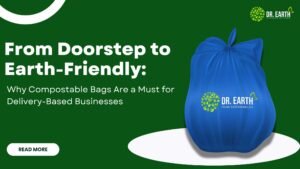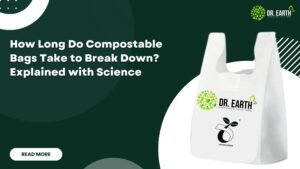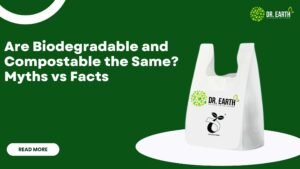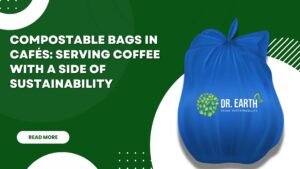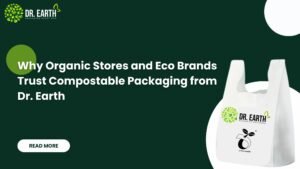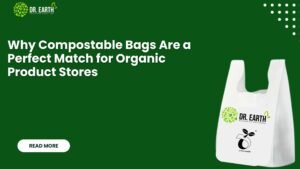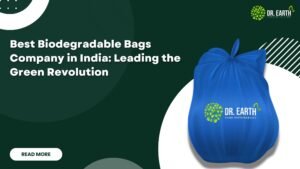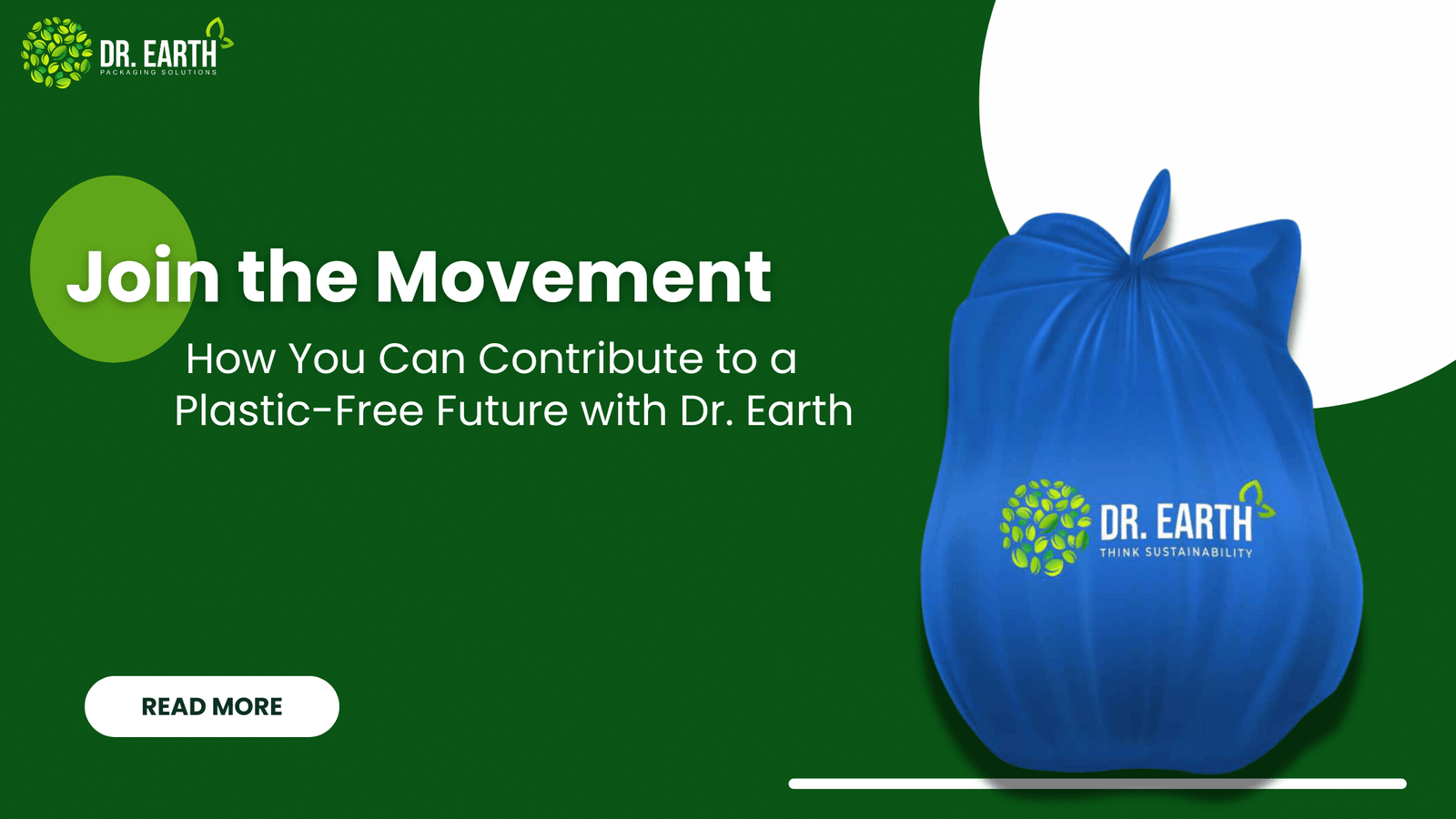
The world has now become familiar with the concept of plastic pollution as one of the biggest threats to our generation. Annually, hundreds of thousand of tons of plastic waste are dump at sea, on land, and in natural ecosystems, negatively impacting wildlife. However, recycling is the only hope that has been espouse for the management of plastic waste; however, available records reveal that the rate of recycling is very low, meaning that most of it will stay in the environment for hundred of years. Thanks to rising environmental concerns about the use of plastics, the export market for sustainable materials is on the rise. This is when the brand of Dr. Earth enters the picture: Dr. Earth offers compostable products to recycle and offers a solution for the ever-increasing problem of plastic.
Understanding the Plastic Problem
Despite the fact that the use of plastic is relatively new in our society, the extent of the harm is all the more shocking. Conventional plastics, categorized by their base materials, are made of polyester or polythene derived from petroleum and do not decompose. Instead, they break down into tiny pieces called microplastics, which can persist in the environment for up to 500 years.Now microplastics are in our seas, lakes, rivers, and even in the ground, as well as in the atmosphere we breathe.
As much as we have realized that plastic remains in the environment for so long, that is not all since it emits toxic substances when it decomposes. It is well document that these chemicals dissolve in soil and water reserves, thereby exposing human and wildlife health. Moreover, the production of plastic requires power and energy, and this contributes to the emission of greenhouse gases, thus fostering climate change.
And yet, the outlined threat of environmental pollution by means of plastic remains valid, and the use of this material increases. These are some of the reasons why people prefer using plastic products in their everyday lives: they are cheap and easily accessible. Nonetheless, this kind of convenience has its impact, and that is the destruction of the environment. I get the whole concept of using plastic, but the question remains as to whether the benefits of using plastic justify the harm it causes to our world so that future generations can inherit a healthy environment.
Dr. Earth: A Sustainable Alternative
Dr. Earth was founded with a clear mission: to provide a functional and practical solution to the problem of single-use plastics. The brand is focuse on manufacturing and distributing various compostable products made from corn and potato starch. Such materials are not only biodegradable but also accredited by the Central Pollution Control Board, the Central Institute of Plastics Engineering, and Technology, the Certificate of Technical Organization, etc. Otherwise, this kind of certification guarantees the company’s products do not compromise on quality or safety for the environment.
The thing that makes Dr. Earth unique is that they care about two things: the efficacy and safety of the products that they offer for sale to consumers. While conventional plastics normally require a few hundred years to degrade, Dr. Earth products have a tendency to degrade within a few months. This process not only alleviates waste products but also improves the quality of the soil, making it healthy.
Other products of Dr. Earth include compostable garbage bags that are manufacture from biodegradable polymers and have no hint of plastic in them. The idea behind these bags is to give people as much ease-of-use as regular (and detrimental) plastic bags. They are sturdy, raise no leakage issues, and are thus suitable for lay use. Consumers who would settle for Dr. Earth’s products can drastically lower their consumption of plastic in their day-to-day lives and hence help make the world a greener place.
The Benefits of Compostable Products
Compostable products hold so many advantages over those traditional plastics that, until now, have dominated our markets. First of all, they can be produce without the use of products base on non-renewable resources, such as plastic, which is base on the use of fossil fuels. Compostable products are also produce with fewer emissions of greenhouse gases in the production process compared with conventional plastics, which makes them better for the environment.
On this account, compostable products are biodegradable and do not cause any harm to the environment since they decompose and leave no residual waste behind. This contrasts sharply with older forms of plastic, which can remain in the environment for hundreds of years. When compostable products are disposed of properly, they break down into natural forms that enrich the soil and support plant growth.
Furthermore, the use of compostable products leads to recycling and reusing the products being use. If compostable products get to a composting facility, they are decompose into compost and can be useful in amending soil and making agriculture green. It helps to decrease the amount of waste and is beneficial for the development of the circular economy, which means the reuse of materials and products.
However, those products that are compostable are safe for human health and have an impact on the environment as well. Plastique generique is known to contain dicyclomine, bisphenol A (BPA), and phthalates, which can migrate into foods and liquids These chemicals cause a number of illnesses, such as disturbance of the endocrine system and carcinoma. Sustainable products, unlike non-sustainable ones, are not made of the above mention degradable substances and are therefore safe for use by consumers.
The Shortcomings of Traditional Recycling
For many years, recycling has been promoted as the solution to the plastic problem, but it’s not that simple In fact, recycling can still barely solve the problem because most of the discarded plastics go to landfills and the sea. Currently, recycling of plastic materials in the world is believe to be at a low of about 9%; hence, most of the plastic waste is not recycle. Recycling some types of plastic is challenging due to frequent contamination of recyclable materials and the limited availability of recycling facilities in many parts of the world.
At the same time, even if much of the plastic is recycle, the recycling itself is not without harm to the environment. Recycling plastic products involves energy and water resources and may result in the generation of greenhouse gases. In addition, the recycled plastic that is available on the market is not as good as virgin material, which restricts its use. Most of the material that ends up being recycle is then reprocess and turn into items of lower quality or ends up in landfills.
Despite acknowledging the fact that the traditional system of recycling has numerous setbacks, Dr. Earth sees a better solution through compostable products. In sum, Dr. Earth‘s choice of products that disintegrate in the environment is a noble idea, and it contributes to the fight against recycling, or ‘the circular economy’. But more to the point, it negates many of the previously discussed problems connected with recycling as well as provides stronger, more sensible authority for the problem of plastic waste.
How You Can Contribute to a Plastic-Free Future
For instance, at Dr. Earth, we are of the opinion that everyone in society has a part to play towards a future free of plastics. We would like to emphasize the thesis that in achieving the vision of making people adopt sustainable behaviors, each choice counts: small actions contribute to big changes. Here are some simple steps you can take to reduce your plastic footprint and support sustainable living:
1. Choose compostable products
Despite this move, one of the most basic steps that people can take towards less use of plastic is picking compostable products any time they are available. Dr. Earth has developed an amazing line of compostable garbage bags and other products that are the best alternative to conventional plastic. On this basis, all kinds of compostable products would greatly decrease the total amount of plastic waste produced and protect the environment.
2. Reduce Single-Use Plastics:
Straws, bottles, and bags are among the largest culprits of plastic pollution, and their use and disposal are often for a single time only. Thus, you will improve the state of the environment if you minimize your use of such products. It is good to limit the use of such things as reusable bags, bottles, and containers instead of single-use plastics. Some of the compostable replacements for regular packaging include Dr. Earth’s garbage bags for food scraps.
3. Support sustainable Brands:
It is also necessary to support brands that consider the product’s sustainability while buying their products, which helps to decrease the level of plastic material utilization. In this way, choosing to purchase a product manufactured by the likes of Dr. Earth means supporting a company that is all about sustainability and the responsible use of resources. Respected organizations like CPCB, CIPET, and CTO certify these products. Products certified by these organizations are environmentally friendly.
4. Compost at Home:
The composting process is as follows: It is one of the most common techniques of waste management that supports a circular economy. Compost food scraps and other compostable items instead of sending them to the dump. This process produces compost that improves the soil. Our products, made from 100% compostable materials, can be composted at home or in industrial facilities, providing great convenience for your composting needs.
5. Educate and Advocate:
Education is the main tool that will push for change. Through creating awareness of the effects of plastic pollution and the positive effects associated with the use of compostable products, many will change their habits to create positive impacts on the environment. Perhaps some ideas for presenting the products of Dr. Earth to friends and, for example, making propaganda about using only compostable products for the inhabitants of their city.
6. Reduce, Reuse, Recycle:
As the use of compostable products is a way better solution than traditional non-recyclable plastics, the concept of reduce, reuse, recycle’ applies fully here. So, if you just use less and, when required, reuse a product, it is possible to go a long way in not harming the environment, and this means supporting the coming future.
Dr. Earth’s Commitment to a Sustainable Future
Dr. Earth Company has adopted the following policy to combat plastic pollution: Forget-me-not products are designed to be both functional and environmentally friendly, offering an alternative to regular plastics that harm the environment. We are excited to join the trend toward a post-plastic world and invite you to be a part of it
Social and environmental responsibility is also a key focus of the company in areas that go beyond the products we offer. The organization works actively on ideas and ways to decrease the negative influence on the environment and enhance performance. It’s from the procurement of green raw materials to embracing the principles of reduce, reuse, and recycle’ within production centers.
However, success also depends on cooperation, as no single institution can achieve efficiency alone. Consumers, businesses, and policymakers must unite to make the necessary changes to stop plastic pollution.Our goal is to become part of the solution in the struggle against the use of one of the most detrimental materials our planet has ever encountered: plastic, and therefore, we constantly strive to do better.
Conclusion
Taking or losing a single plastic bag can have a severe impact on the environment, and the consequences are universal; hence, it calls for a global solution. While the problem may seem overwhelming, everyone can contribute to bringing about change. Consumers can make better choices by opting for compostable products and also avoiding the use of plastics, and they can encourage other people to do the same by promoting brands belonging to sustainable products and raising awareness about the issues of plastic waste.
FAQS
Q: 1. What are Dr. Earth’s products made from?
Ans: Dr. Earth fertilizer bags and packets are biodegradable, and the company uses its corn and potato starch to manufacture them.
Q: 2. Are Dr. Earth’s bags as strong as regular plastic bags?
Ans: They are intended to be strong, water-tight, and able to withstand a great deal of wear and tear.
Q: 3. Can I compost Dr. Earth’s products at home?
Ans: Yes, they are good for home compost and even for industrial compost as well.
Q: 4. What certifications do Dr. Earth’s products have?
Ans: Our products are certified by CPCB, CIPET, and CTO to ensure they meet quality and environmental standards
Q-5: How should I dispose of Dr. Earth’s products?
Ans: If feasible, bury them, use them as compost, or place them in the organic waste bin or general waste bin
Share:
Related Posts
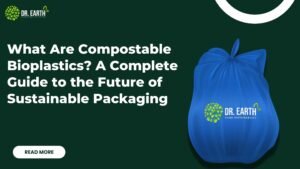
What Are Compostable Bioplastics? A Complete Guide to the Future of Sustainable Packaging
Read More »Send Us A Message
Related Posts
